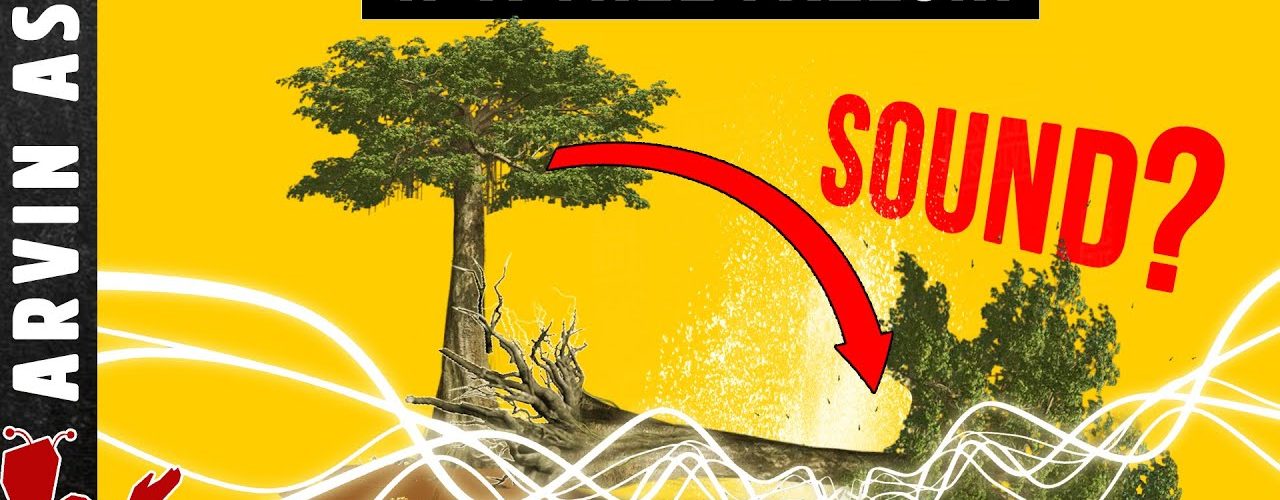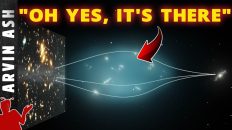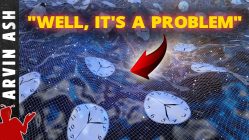If a tree falls in a forest and no one is around to hear it, does it make a sound?
Philosopher George Berkeley asked this famous question over three hundred years ago in 1710, and people are still debating it. The question is deceptively simple, but it is not so simple to answer it. Why? because it is vague and the answer is not straightforward.
Where is the forest located. How is sound defined?
Does it mean vibrations of air molecules that enter your ear? What if you are deaf? would you be able to see or imagine the sound by watching the tree fall.
What do the words “no one” mean? Does it mean human being, what about animals? Aren’t they also ones?
Let’s define this question, and answer once and for all from a scientific perspective…whether this lonely tree makes a sound? The answer to this question is going to require us to invoke, not just philosophy, but also believe it or not, biology and general relativity…This is a fun video that you don’t want to miss.
So the question is: If a tree falls in a forest and no one is around to hear it, does it make a sound? First let’s tackle the question of what is a sound?
Three things are needed to make a sound. A vibration, a medium through which the vibration can propagate, and a receiver to measure or acknowledge that a sound was made.
What we think of as sounds are really waves – waves of high and low air pressure called compression and refraction. The amplitude of the wave determines how loud the sound is. And the frequency of the waves determines the pitch that we hear. The shorter the wavelength the higher the pitch.
These waves of pressure enter our ear canal, which vibrate our eardrum which transfers this vibration to 3 tiny bones in the middle of our ear, which in turn transfer the vibrations to fluids inside the cochlea.
And eventually these vibrations result in an electrical signal carried by the auditory nerve to the auditory complex of the temporal lobe of the brain. It is here that the electrical signals are processed and interpreted. This allows us to become conscious of the sound and enables us to hear things.
Note that the medium does not have to be air, sound waves can be carried through water or metal or just about any kind of medium. In fact sound travels through water and most solids better than it does through the air, because water and metal are less compressible so the energy of the sound does not dissipate as quickly.
The frequency of sound that our brains can interpret however is limited to between 20Hz to 20kHz. One hertz just means one cycle per second. The higher the frequency, the higher the pitch.
Let’s take a tree that falls in the woods and no one is around. “One” usually means a person. But is sound only a sound when a person hears it? What if a dog hears it? If no person is around, the sound can still be perceived by animals.
Should the word “one” really mean only a person. This may be a philosophical question, but if we define the word “one” meaning someone or something that is conscious enough to perceive the sound, then I think we have to bring all conscious beings into consideration.
There may be levels of consciousness. Is a dog any less conscious than a human. They and other animals hear sounds using the same mechanism as us. In many cases their hearing is actually more acute than ours. Dogs for instance, can hear sounds more than 45Khz.
Is it not the height of human arrogance to think that the sound only exists when a human hears it? There are billions of creatures other than humans on earth that can perceive sounds. If they perceive, they are conscious to some degree.
What if an advanced extraterrestrial being from another planet who is perhaps more advanced and more conscious than humans, defined “one” as being only from their species – would they believe that the sound did not occur if lowly humans heard the sound, and one of their kind didn’t? My contention is that any animal with a hearing apparatus that can receive the sound and is capable of processing the sound, can hear the sound.
What if we take all the animals out of the forest, so that there is no possibility of any human or animal hearing the sound. What then?
Well now there are still thousands and possibly millions of insects in the forest that can definitely hear sounds. A fly for example, can hears sounds in the range of 50Khz – which is even higher than dogs.
Flies may not be as intelligent as humans or dogs, but they are animals with ability to hear sounds, and will definitely hear the tree fall in the woods.
What if we take all the creatures from the animal kingdom out of the picture, including all the insects in the forest. How about now? Is there a sound.
But there are more than just insects in the area. There are other trees. In a 2014 study published in the California Academy of sciences, It was been shown that plants can detect and respond to sounds. It’s been theorized that sounds could trigger a response via mechanoreceptors, or fine hairlike structures.
In addition, there are trillions upon trillions of microscopic life forms still present – bacteria, viruses, and other creatures in ponds and puddles of water, and in ther air. Can bacteria perceive sounds? There is probably no way to directly know this. But in a 2016 study by Shaobin Gu et al, experimental results showed that E. Coli bacteria exposed to sound waves had a faster specific growth rate compared to the control group. In other words, sounds affected bacteria. Is this not evidence for a kind of “hearing” of sounds by bacteria? E. Coli bacteria are present in massive quantities in forests. Even with no big animals around, something can still hear the tree fall.
Let’s go one step further, let’s take all the microscopic creatures out of the picture, and let’s take all other plants out of the picture. In fact. Let’s take all living things out of the forest. Maybe it is lonely tree in the middle of a desert with no other life forms. Note that this is hypothetical and not realistic, because even a lonely in a desert would be surrounded by living things in the sand and air.
But for the sake of argument, we will take every single living thing out of the forest. Then what happens if the tree falls? Well, if the tree falls, air is still present and sand is still present. When it falls, air is disturbed, and sand is disturbed to some degree. If there are no living things nearby to perceive the sound, did the tree create a sound?
Well, it depends on how far the sound propagates. A large tree would likely create extremely low frequency sound waves, which can travel very large distances. In fact, sonic waves with a frequency below 20 hz are imperceptible to the human ear. But elephants can hear them over 15 miles away. If the tree was located in a forest in Africa or jungle in Asia, an elephant might very well be within an 15 mile radius and could hear the sound.
Let’s take all elephants within an 15 mile radius out of the picture. What then? Well, the sand was disturbed, the air was disturbed.
It turns out that if the air is disturbed, the micro disturbance of the air, particularly low frequency sound in the hot air that would be present from a tree falling in a desert could propagate for over 50 miles, particularly if there are no structures to absorb the sound, as would be expected in a forest. Sound waves from nuclear blasts have been known to circumnavigate the earth several times. There are sure to be life forms within that radius that could sense to some degree this pressure disturbance. There are small insects the size of fruit flies that may be able to feel the small disturbance in the air. Is this not a form of “hearing” the tree fall? Or a microscopic virus or bacteria in the air whose flight path may have been changed by the disturbance in the air. Is this not a form of “hearing” or perception of the sound.
But let’s go further and eliminate all living things within a 100 mile radius of the tree, then what? Well if the tree falls it creates air vibrations that no animal or living thing can perceive within a 100 mile radius. But wait, what about the tree itself? Just because a tree falls, it does not mean that the tree is dead. If it was a living tree, it can survive for quite some time even after falling, and even after its main limb is completely severed.
The leaves of the tree will be disturbed. And given what I said above about plants being able to perceive sounds, the tree itself will “hear” its own fall. Thus, it will make a sound that can be perceived.
But let’s go even further and say that this was a dry dead tree in a desert with absolutely no living thing nearby for over a 100 miles radius. Then what? Is there any possibility that it made a sound.
Well it did make a sound, but no living thing was there to hear it. But a change in the universe occurred. The potential energy of an upright tree was converted to kinetic energy. And this kinetic energy was converted to disturbance in the air and ground, and the sound hitting the ground would propagate through the earth. How far this sound propagates depends on the density of the ground, the temperature and other factors. If was an extremely dense ground that it was sitting on, this sound would propagate quite far, but it would probably be less than 100 miles, so no one, no animal, and no life form would be there to hear it.
Here we get into some semantics, if the question is interpreted as “did” the tree make a sound vs. “does” the tree make a sound. It definitely did make a sound. But nobody was there at the time to perceive the sound.
However, if a scientist is allowed on to the scene and is asked whether the tree made a sound. He would be able to ascertain from examining the changes in the sand, the sand underneath the tree and nearby the tree, that indeed the tree must have fallen, and made a vibration which created a sound because air was present, and the ground was present. So I say the tree does make a sound because instrument can ascertain after the fact that the tree unequivocally must have made a sound.
What if we take all the air away from the forest? Will the tree make a sound then? Well yes, the sound will not propagate through the air, but now it will propagate through the medium of the ground as soon as the tree hits the ground. Sound merely needs some medium to propagate. This medium does not necessarily have to be air.
Ok, let’s go further and eliminate all the air and the ground from the vicinity of the tree. Let’s make the tree free floating in space with no air and no ground. And we let it fall. Well, if it’s in space, there is no up and no down, so technically the tree can not fall in space.
But for the sake of argument let’s just change the direction that the tree is pointing from the perspective that we may be viewing it in space and lets say we apply a force such that it changes the tree’s position in space relative to how we may be viewing it.
Well, in space if we apply a force to the tree to make it change its position, it will continue to rotate because there is nothing to stop this rotation. There is no friction in space.
The energy we impart to push the tree will be converted to the rotational energy of the tree, so the tree will keep rotating. So to make this appear more like falling instead of spinning, let’s say we applied a force to not only begin the rotation, but a force to stop the rotation as well. What then? Did it make a sound.
Well, since there is no medium such as air or ground to carry the sound, the kind of sound that we humans or animals or living things on earth may recognize did not get made. So, it made no known sounds that we are aware of.
But did it make a different kind of sound. And I will use the word “sound” in quotation marks here.
Did the tree make any difference in the universe that could be perceived by an instrument. I would have to say that it did in the sense that the tree has mass. Mass as we know always bends space time. By moving the mass, we have made a change in the gravitational bending of space that surrounds this tree. And we have added energy to the tree by increasing its kinetic energy, which also affects space time. This is a difference that tree has made in the universe. If we had sensitive enough instruments, we could detect this difference in the gravitational disturbance made by the tree.
This instrument would allow us to “hear” (quote unquote) the tree change its trajectory even in space. But then again a tree in space, could not really fall, so we are probably just wallowing in semantics at this point.
But the main point is if a tree falls in a real forest, it has made a sound. And this sound has made a difference in the environment. It has changed the universe in some small way. That change can be perceived, or has the potential to be perceived by someone or something, sometime, somewhere, somehow.
No tree can fall without changing the universe in some way. And any instrument or being that can detect this change in the universe, will be able to “hear” the tree fall.







